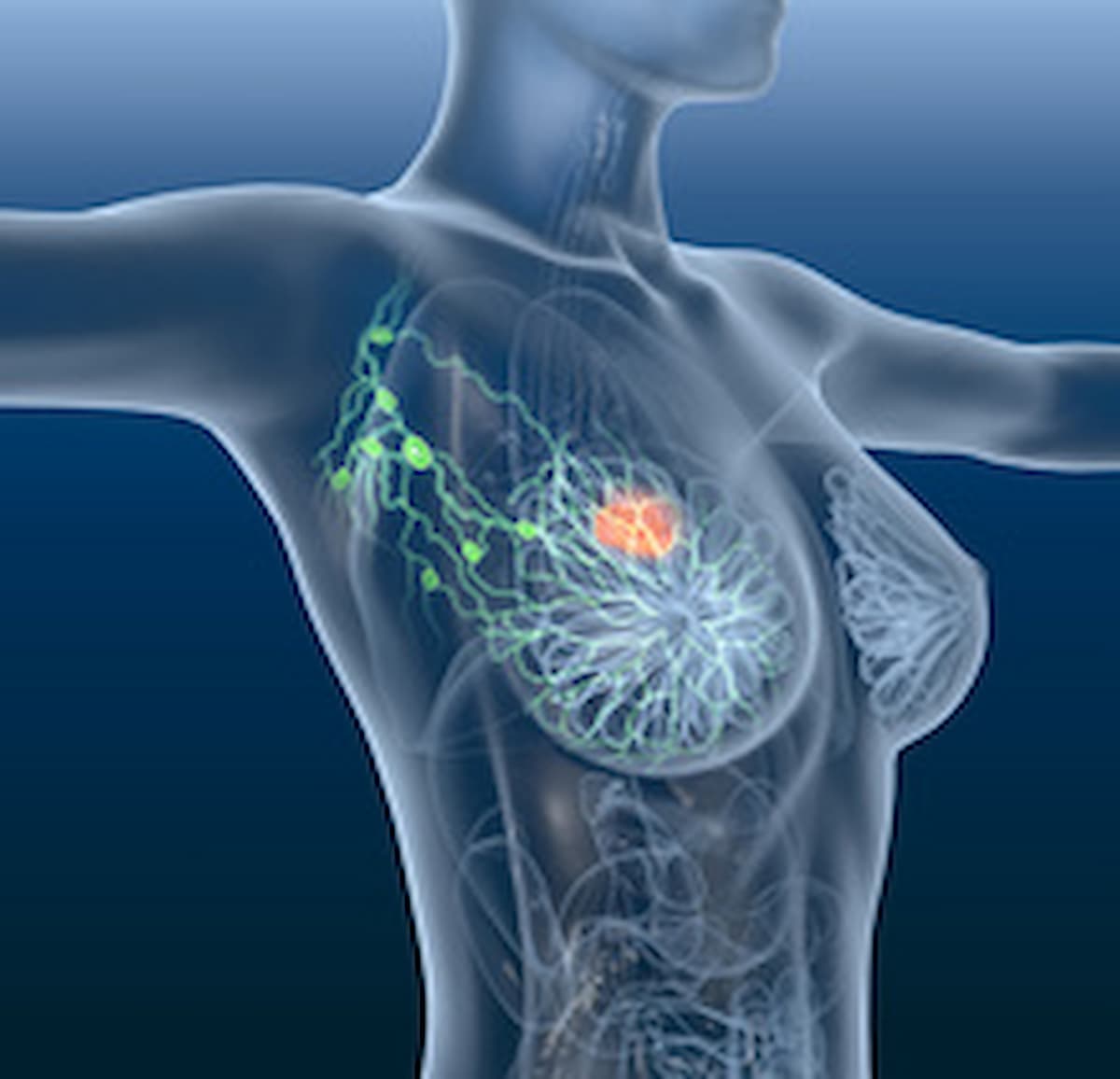T-DXd Improves Invasive DFS vs T-DM1 in HER2+ Early Breast Cancer Subgroup
Planned interim results from the phase 3 DESTINY-Breast05 trial showed no new safety signals with T-DXd in the trial population.
Planned interim results from the phase 3 DESTINY-Breast05 trial showed no new safety signals with T-DXd in the trial population.

Fam-trastuzumab deruxtecan-nxki (T-DXd; Enhertu) improved invasive disease-free survival (IDFS) compared with trastuzumab emtansine (T-DM1; Kadcyla) as treatment for patients with HER2-positive early breast cancer with residual invasive disease in the breast or axillary lymph nodes after neoadjuvant treatment and a high risk of disease recurrence.1 These results came from a planned interim analysis of the phase 3 DESTINY-Breast05 trial (NCT04622319).
Overall survival (OS) data were not fully mature and will be assessed at a subsequent analysis. Additionally, T-DXd demonstrated a safety profile consistent with previously reported analyses.
Notably, this was the second phase 3 trial evaluating T-DXd with positive findings, including the phase 3 DESTINY-Breast11 trial (NCT05113251), which showed that T-DXd with chemotherapy improved pathologic complete responses vs standard of care in the HER2-positive early breast cancer setting.2
These results from DESTINY-Breast05 will be shared at the European Society for Medical Oncology (ESMO) Congress 2025 during Presidential Symposium 1; they will also be submitted to global regulatory authorities.
“This landmark trial is the first to directly compare [T-DXd] and T-DM1 in early breast cancer, and the results clearly show that [T-DXd] delivers superior outcomes, indicating that it may be a better option for patients with high-risk HER2-positive disease in the postneoadjuvant setting,” said Susan Galbraith, executive vice president of oncology hematology research and development at AstraZeneca, in the press release.1 “These results from DESTINY-Breast05, coupled with DESTINY-Breast11, underscore our commitment to moving [T-DXd] into early-stage HER2-positive breast cancer where patients can achieve sustained long-term outcomes, increasing the opportunity for cure.”
DESTINY-Breast05 is a randomized, multicenter, open-label, active-controlled trial that enrolled a total of 1635 patients with HER2-positive primary breast cancer at high risk of recurrence who have residual invasive disease in the breast or axillary lymph nodes following neoadjuvant therapy across Asia, Europe, Oceania, North America, and South America.
High risk was defined as presentation with inoperable cancer prior to neoadjuvant therapy or pathologically positive axillary lymph nodes following neoadjuvant therapy.
Additional eligibility criteria included an age of 18 years or older, an ECOG performance status of 0 or 1, pathologically documented disease, histologically confirmed invasive breast carcinoma, and adequate organ function.3
Exclusion criteria were stage IV disease, evidence of clinically evident gross residual or recurrent disease following neoadjuvant therapy and surgery, known pulmonary compromise resulting from intercurrent illnesses, medical history of myocardial infarction within 6 months of random assignment, and history of noninfectious interstitial lung disease that required steroids, among other reasons.
Patients were randomly assigned to receive either 5.4 mg/kg of intravenous T-DXd on day 1 of each 21-day cycle or 3.6 mg/kg of intravenous T-DM1 on day 1 of each 21-day cycle.
The trial’s primary end point was IDFS. Secondary end points included DFS, OS, distant recurrence-free interval, brain metastases–free interval, treatment-emergent adverse effects, percentage of patients with positive results for treatment-emergent antidrug antibodies, and serum concentrations of T-DXd.
“In patients with early breast cancer with residual disease following neoadjuvant treatment, it is critical to optimize treatment as this represents the last opportunity to prevent progression to metastatic disease,” added Ken Takeshita, MD, global head of research and development at Daiichi Sankyo.1 “The results of DESTINY-Breast05 demonstrate that treatment with [T-DXd] following surgery increases the length of time patients are able to live free of invasive disease compared with the existing standard of care, potentially offering patients with HER2-positive early breast cancer a new treatment approach in this curative-intent setting."
The DESTINY-Breast05 trial was done collaboratively with the National Surgical Adjuvant Breast and Bowel Project Foundation, the German Breast Group, Arbeitsgemeinschaft Gynäkologische Onkologie, and SOLTI Breast Cancer Research Group. The trial was initiated in November 2025.4
References
- ENHERTU (fam-trastuzumab deruxtecan-nxki) demonstrated highly statistically significant and clinically meaningful improvement in invasive disease-free survival vs. T-DM1 in DESTINY-Breast05 phase III trial in patients with high-risk early breast cancer following neoadjuvant therapy. News release. AstraZeneca. September 29, 2025. Accessed September 29, 2025. https://tinyurl.com/4v3ax79f
- ENHERTU (fam-trastuzumab deruxtecan-nxki) followed by THP before surgery showed statistically significant and clinically meaningful improvement in pathologic complete response in patients with high-risk HER2-positive early-stage breast cancer in DESTINY-Breast11 phase III trial. News release. AstraZeneca. May 7, 2025. Accessed September 29, 2025. https://tinyurl.com/4sstj24x
- A study of trastuzumab deruxtecan (T-DXd) versus trastuzumab emtansine (T-DM1) in high-risk HER2-positive participants with residual invasive breast cancer following neoadjuvant therapy (DESTINY-Breast05). ClinicalTrials.gov. Updated May 9, 2025. Accessed September 29, 2025. https://tinyurl.com/2s4fhnw4
- DESTINY-Breast05 head-to-head phase 3 trial of ENHERTU versus T-DM1 initiated in patients with HER2 positive early breast cancer at high risk after neo-adjuvant therapy. News release. Daichii Sankyo. November 2, 2020. Accessed September 29, 2025. https://tinyurl.com/3vy7m83z